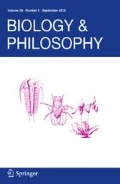Abstract
Approaching science by considering the epistemological virtues which scientists see as constitutive of good science, and the way these virtues trade-off against one another, makes it possible to capture action that may be lost by approaches which focus on either the theoretical or institutional level. Following Wimsatt (1984) I use the notion of heuristics and biases to help explore a case study from the history of biology. Early in the 20th century, mutation theorists and natural historians fought over the role that isolation plays in evolution. This debate was principally about whether replication was the central scientific virtue (and hence the ultimate goal of science to replace non-experimental evidence with experimental evidence) or whether consilience of inductions was the central virtue (and hence, as many kinds of evidence as possible should be pursued).
Similar content being viewed by others
References
Coleman, William: 1971, Biology in the Nineteenth Century, Cambridge University Press, Cambridge.
Davenport, C.B.: 1905, ‘Review, Species and Varieties’, Science 22, 369.
Davenport, C.B.: 1906, ‘The Mutation Theory in Animal Evolution’, Science 24, 556–558.
De Vries, Hugo: 1909–1910, The Mutation Theory, 2 vols., Trans. J.B. Farmer and A.D. Darbishire, Open Court Publishing Co, Chicago.
De Vries, Hugo: 1905, Species and Varieties, Ed. Daniel Trembly MacDougal, Open Court Publishing Co., Chicago.
Dobzhansky, Theodosius: 1937, ‘Genetics and the Orgin of Spcies’, Columbia University Press, New York.
Gager, C.S.: 1906, ‘De Vries and His Critics’, Science 24, 81–89.
Gerson, Elihu: 1993, Talk given at the International Society for the History, Philosophy and Social Studies of Biology meeting, Brandeis University.
Hagen, Joel: 1988, ‘Organism and Environment: Frederick Clements's Vision of a Unified Physiological Ecology’, in Rainger, Benson, Maienschein, eds., The American Development of Biology, University of Pennsylvania Press, Philadelphia, pp. 257–280.
Jordan, D.S.: 1905, ‘The Origin of Species through Isolation’, Science 22, 545–562.
Jordan, D.S.: 1906, ‘Discontinuous Variation and Pedegree Culture’, Science 24, 399–400.
Jordan, D.S.: 1916, ‘Plea for Old-fashioned Natural History’, Bulletin of the Scripps Institution for Biological Research, 3–6.
Kingsland, Sharon: 1991, ‘The Battling Botanist: Daniel Trembly MacDougal, Mutation Theory, and the Rise of Experimental Evolutionary Biology in America, 1900–1912’, Isis 82, 479–509.
Lloyd, E.A.: 1983, ‘The nature of Darwin's support for the theory of natural selection’, Philosophy of Science 50, 112–129.
MacDougal, D.T.: 1905, ‘Discontinuous Varieties, their Origin of Species’, Science 21, 540.
MacDougal, D.T.: 1906, ‘Discontinuous Variation in Pedigree Cultures’, Popular Science Monthly 67.
Magnus, David: forthcoming, ‘Down the Primrose Path: Competing Epistemologies in Early Twentieth Century Biology’.
Maienschein, Jane: 1991, ‘Epistemic Styles in American and German Embryology’, Science in Context 4, 407–427.
Maienschein, Jane: 1991, Transforming Traditions in American Biology, 1880–1915, Johns Hopkins University Press, Baltimore.
Mayr, Ernst: 1980, ‘Prologue’ and ‘The Role of Systematics in the Evolutionary Synthesis’, in Mayr and Provine, eds., The Evolutionary Synthesis, Harvard University Press, Cambridge, pp. 1–50, 123–136.
Ortman, A.E.: 1906a, ‘Facts and Theories in Evolution’, Science 23, 947–952.
Ortman, A.E.: 1906b, ‘The Mutation Theory Again’, Science 24, 214–217.
Ruse, Michael: 1975, ‘Darwin's Debt to Philosophy’, Studies in the History and Philosophy of Science |bf 6, 159–181.
Thagard, Paul: 1977, ‘Darwin and Whewell’, Studies in the History and Philosophy of Science 8, 353–356.
Tversky, Amos and Daniel Kahneman: 1974, Science 185, 1124–1131.
Van Fraasen, Bas: 1980, The Scientific Image, Oxford University Press, Oxford.
Vaughan, T.W.: 1906, ‘The Work of Hugo De Vries and Its Importance in the Study of Problems of Evolution’, Science 23, 682–691.
Whewell, William: 1847, The Philosophy of the Inductive Sciences, Founded Upon their History, 2nd ed., Parker, London.
Wimsatt, William: 1984, ‘Reductionistic Research Strategies and Their Biases in the Units of Selection Controversy’, in Elliot Sober, ed., Conceptual Issues in Evolutionary Biology, MIT Press, Cambridge, Mass., pp. 142–183.
Wright, Sewall: 1929, ‘The Evolution of Dominance’, American Naturalist 63, 556–561.
Wright, Sewall: 1932, ‘The roles of mutation, inbreeding, crossbreeding, and selection in evolution’, Proceedings of the Sixth International Congress of Genetics 1, 356–366.
Author information
Authors and Affiliations
Rights and permissions
About this article
Cite this article
Magnus, D. Heuristics and Biases in Evolutionary Biology. Biology & Philosophy 12, 21–38 (1996). https://doi.org/10.1023/A:1017953510082
Issue Date:
DOI: https://doi.org/10.1023/A:1017953510082



